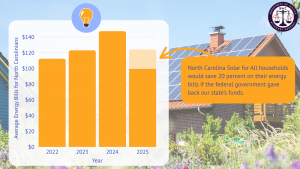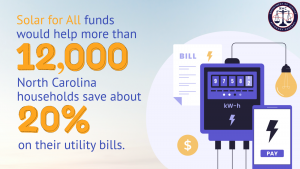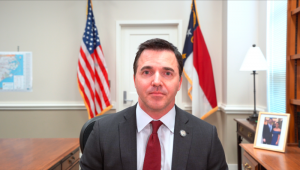For Immediate Release:
Thursday, October 16, 2025
Contact: nahmed@ncdoj.gov
(919) 538-2809
RALEIGH – Today, Attorney General Jeff Jackson and 22 other states sued the Environmental Protection Agency to win back more than $7 billion nationwide, and $150 million due to North Carolina, to help low-income and rural communities use solar power to save on energy costs. The funds would have helped more than 12,000 households in North Carolina save an average of 20 percent on their utility bills and supported energy jobs.
“These funds were going to help low-income and rural North Carolinians save money on their energy bills,” said Attorney General Jeff Jackson. “Thousands of families were going to have the option to install solar power, save money, and have another energy option after a major storm. Now the EPA has illegally cancelled those funds – so I’m going to court to bring $150 million back to our state.”
“The U.S. EPA’s cancellation of North Carolina’s $150 million Solar for All program would eliminate the installation of rooftop solar panels for more than 12,000 low- and medium-income families,” said Department of Environmental Quality Secretary Reid Wilson. “Rooftop solar drives down utility bills, reduces air pollution and creates jobs. The program’s cancellation would hurt the electric grid’s ability to be resilient to future disasters, and would hamper North Carolina’s efforts to ensure reliable, clean and affordable energy supplies to meet the needs of a rapidly growing population and rising energy demand.”
The Solar for All program was created in 2022 as a result of the Inflation Reduction Act, and Congress appropriated $7 billion to fund the program. In 2024, the EnergizeNC coalition, led by the North Carolina Department of Environmental Quality, applied for and was awarded a Solar for All grant from the EPA. Over five years, the program would have helped create at least 43 megawatts of solar energy and offered financial assistance to help low-income, single-family homes, multifamily housing, households with medical needs, and community solar pilot programs install rooftop solar. Without Solar for All funding, these households cannot afford to install rooftop solar and save on their electricity bills.
The funds would also have helped households transition to more reliable sources of energy and prevent power outages caused by natural disasters, like Hurricane Helene. When Helene hit, nearly 1.2 million Duke Energy customers lost power in North Carolina, some for weeks. Households with solar panels can store energy for use later and generate energy when the grid is down, which means solar-powered households still have energy and electricity during power grid blackouts.
In addition to the savings for North Carolinians, the Solar for All program was also designed to help create local jobs, including for contractors, construction workers, and maintenance staff. The solar energy industry employs more than 9,000 North Carolinians and helps more than 200 businesses operate throughout the state. Solar for All would have created another 140 new jobs, especially in rural areas. In a letter to Attorney General Jackson, solar energy business leaders wrote that the funding cuts would, “deny small businesses the benefits of those investments that they have planned for in anticipation of the program.”
North Carolina went through a rigorous application process to get these funds. In addition to the application, the state was required to submit tracking data and regular reports to ensure that funds were successfully being used to help low-income households save on energy costs. EPA awarded $156 million in Solar for All funds to NC in July of 2024. But in August of this year, the EPA unilaterally cancelled all grant agreements, leaving North Carolina without more than $150 million of the $156 million it had been awarded. The agency then sent memos to all recipients, including North Carolina, saying EPA no longer has a “statutory basis or dedicated funding” for the program, even though Congress never directed EPA to cancel funds that had already been awarded. In fact, Congress did the opposite by only rescinding unawarded Solar for All funds when it passed the BBB. The grants were abruptly cancelled without a valid legal basis, and the attorneys general are suing to win back this money that is legally due to North Carolina and other states.
In their complaint filed in the U.S. District Court for the Western District of Washington, the states allege that the EPA violated the Administrative Procedure Act and the U.S. Constitution’s Separation of Powers Doctrine in unlawfully canceling the program. Attorney General Jackson also joined states filing a second lawsuit in the U.S. Court of Federal Claims arguing that EPA breached the clear terms of the agreements and violated the duty of good faith and fair dealing in canceling their Solar for All grants.
You can read the complaints here and here.
VIDEO
Download the full video clip HERE.
Quotes from the video:
“This money was going to go to low-income families and rural communities to help them save money on their energy bill. It was going to save them at least 20 percent per month.”
“We had over $150 million authorized by Congress in an account with our name on it, when EPA suddenly decided to cancel it out.”
“Most importantly, this is about your tax money. Money you already sent to Washington that was supposed to come back here.”
GRAPHICS


QUOTES
“The EnergizeNC program, funded by Solar for All, was poised to invest $117 million in residential solar projects that would serve 12,500 low-income households. Each participating household would save at least 20 percent on their yearly electric bills – translating to about $400 per year for families that are struggling to manage the costs of inflation, housing, groceries and health care. Nationally, low-income households spent over 15% of their income to heat, cool and power their homes, and that energy burden is rising in the Southeast. Solar on the rooftop could provide much-needed, kitchen-table relief. EnergizeNC was primed to deploy a pilot program for home solar and battery backup that would offer back-up power during grid outages for households with medical equipment needs. That battery backup equipment would do double-duty by helping utilities manage the electric grid on very hot or very cold days, when power needs surge. Finally, the economic impact of the attempted cancellation of Solar for All is a major blow to the homegrown entrepreneurs and small businesses that dominate North Carolina’s clean energy sector and provide jobs with family-supporting wages. Anecdotally, they report that they expect a reduction of 30% in their installations through 2029, should EnergizeNC remain frozen.”
- Melissa Malkin-Weber, Executive Co-Director of Clean Energy Fund of the Carolinas
“Sadly, the loss of funding for the Solar for All Program means higher energy bills and less resiliency to increasing weather extremes for the 12,000 plus low-income and disadvantaged citizens that were targeted for this solar and battery program in NC. The elimination of these important funds will also cause the loss of hundreds of high-paying electrical trade jobs in the NC solar industry.”
- Stew Miller, co-founder and president of Yes Solar Solutions
“North Carolina’s Solar for All program is a historic investment in energy affordability and economic development. Thanks to this program, 12,500 households across the state would gain access to low-cost, reliable energy that would lower their electric bills — while boosting grid resilience and promoting energy independence. In addition, Solar for All is expected to create good-quality, local jobs in North Carolina, from contractors to construction workers — jobs that cannot be shipped overseas.”
- Cassie Gavin, director of policy for the NC Sustainable Energy Association
IMPACTS OF FUNDING TERMINATION
Charlotte Observer: EPA cancels Solar for All funding, halting NC solar work
- Supporters of the Solar for All program say it would help 900,000 low-income households across the country, including an estimated 12,000 in some of North Carolina’s poorest counties, get access to solar power. That would be through a combination of rooftop solar panels for individual homes and larger installations for multi-family housing.
- “While North Carolina has among the largest solar-power production capacities of any state in the country according to the U.S. Energy Information Administration, up-front costs for rooftop home installations of up to $20,000 are a barrier for many households. Grant money from Solar for All could help low-income families install solar that could result in significant savings on monthly power bills over time,” said Jen Weiss, co-director of the N.C. Clean Energy Fund.
- Steve Kalland, executive director of the N.C. Clean Energy Technology Center, said this week North Carolina also planned to use Solar for All funds to pilot a program that would provide solar power and battery backup to families who have essential electrical medical devices that can shut down during a power outage such as those caused by ice storms and hurricanes.
Blue Ridge Public Radio: After EPA cuts, an NC solar program for low-income homes is on the line
- EnergizeNC has been in a design phase for the past year. Its mission is to subsidize clean energy businesses so they can provide solar energy to low income communities and homeowners, although much of its specific program requirements are still to be determined, The program was supposed to launch in earnest late this year aiming to help 12,500 North Carolina households reduce their utility bills.
- Sugar Hollow Solar was on a list of solar contractors that helped the EnergizeNC coalition plan and design their program, along with Murphy-based Carolina Mountain Solar, Weaverville-based Sundance Power Systems, and others from across the state. “It’s unfortunate that, you know, that funding just kind of got pulled out,” Sundance Power Systems vice president Brian Hollister said. “We were pretty far into the process.”
Spectrum: Concerns over EPA’s cancellation of solar energy program in N.C.
- “The average household that participates in this program is expected to save $400 per year on their electricity bill,” Natural Resources Defense Council Director of Blended and Inclusive Finance Adam Kent said. “This program is all about installing clean energy locally, so this program is estimated to create hundreds of thousands of good, quality, local jobs.”
- “At a time when energy costs and demand are both rapidly increasing, it is concerning that your agency is considering an action that may violate federal law — Congress has already appropriated the funding — and would increase household energy costs for millions of Americans while jeopardizing thousands of jobs across a wide cross section of states,” the [North Carolina’s Democratic] members [of Congress] wrote in their letter.
- “The solar energy industry employs more than 9,000 people across more than 200 businesses statewide,” the [Department of Environmental Quality] said in an emailed statement. “The resilience benefits of this program are particularly important in North Carolina after recent extreme weather events. Termination of this program puts economic prosperity and energy security at risk for all North Carolinians.”
- Distributed energy means events like blackouts can be less likely, as there are fewer houses straining the system. When individual households decrease their reliance on the grid, it increases overall grid resiliency.
###

